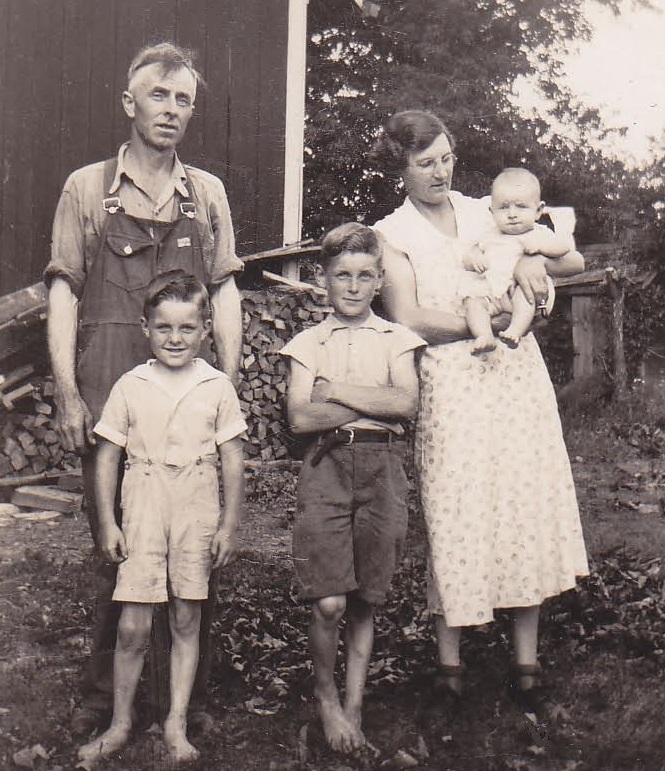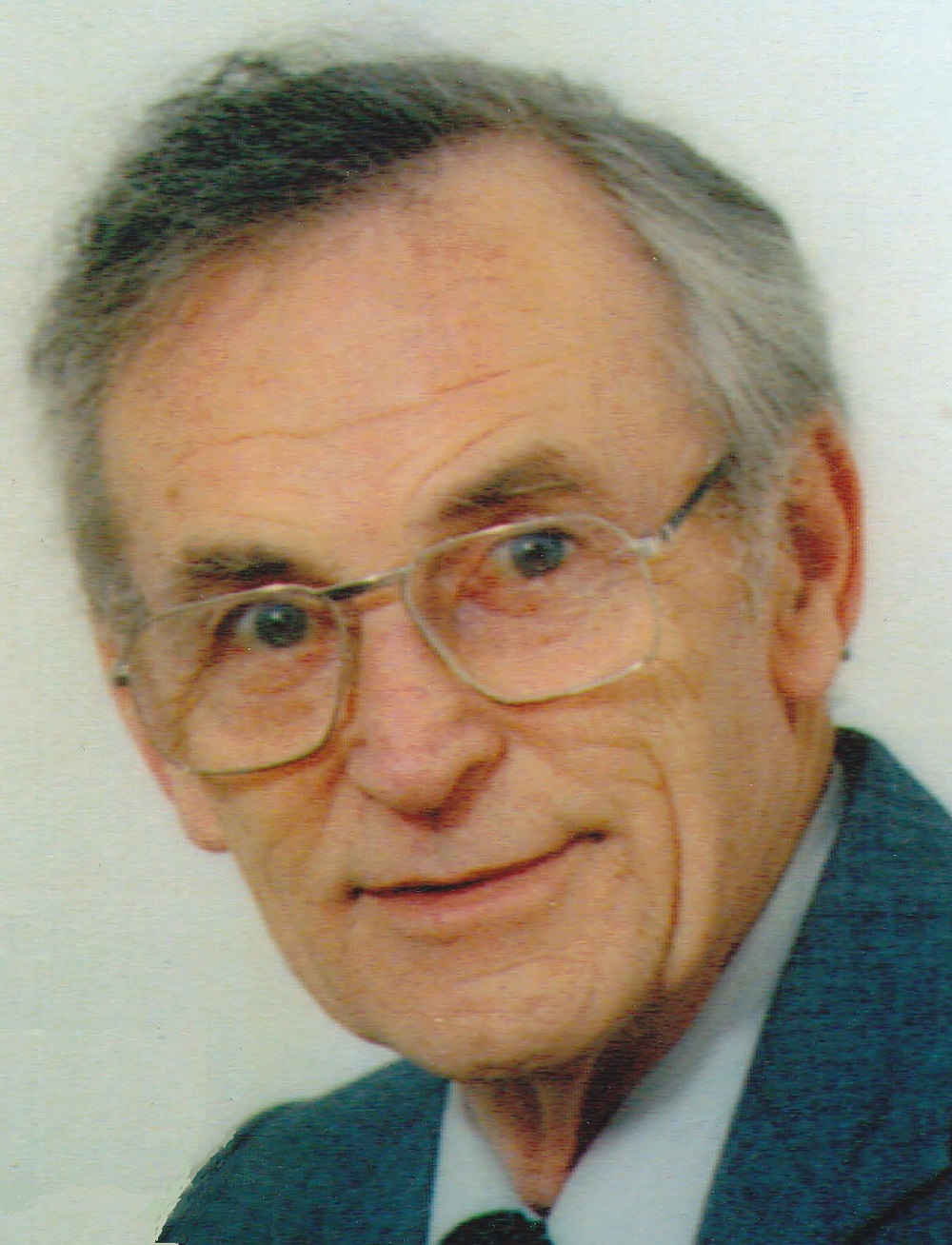Given by son-in-law Ken Westhues at the service on November 16, 1998, at the A. Millard George Funeral Home, London, Ontario.
Scroll up for obituary or click HERE.
|
EULOGY
Bob Dietz was a man of few words. He would not be pleased if I went on at length in flowery phrases about how great a man he was.
Chesterton wrote that "all men are ordinary. The extraordinary ones are the ones that know it." Bob was among the extraordinary ones. He had taken to heart what Lincoln once said, that it is better to keep your mouth shut and let people think you're stupid, than to open it and remove all doubt.
Bob Dietz was a walking understatement, out of sync with our time. The priority in this age of hype is on projecting an overblown image, letting others discover later, when it's too late, that there is less to you than meets the eye. With Bob Dietz it was the other way around. He lived by the principle of what you see is what you get. The more you saw of Bob Dietz, the bigger, smarter, steadier and more decent a man you realized he was.
His profession was in keeping with this plain, honest approach to life. Saturday's Globe and Mail reported results of a survey that asked Canadians how much respect they have — from a great deal down to not much — for each profession on a list.
Do you know which one came out on top? Well above doctors, teachers, professors, and judges. Even farther above corporate executives, lawyers, and politicians.
The most respected profession in the survey turned out to be small business owners. Bob Dietz was one of them. To his customers he gave an honest day's work for an honest day's pay. To his employees he gave an honest day's pay for an honest day's work. If he agreed to do a job, he did it. Bob did not know how to whine.
As his children can attest, he was not fond of hearing other people whine either. Not that he would rant and rave about it. Bob didn't rant and rave about much of anything — except London city politics. Most often, Bob's silence spoke volumes.
Bob took delight in the work of his hands and mind. I never saw him do a job that he didn't find some occasion for laughter, and some way to have fun.
Back in 1972, when Anne and I were newlyweds, we bought a huge old house near Strathroy that needed lots of work. "Help, Dad," we said. Bob came with his men and Anne's brothers. There was lots of work. We decided to build a double garage, too.
"How big shall we make it," I asked him.
A few moments of silence, then, "Big enough that I can drive the van in one side, turn around, and drive out the other side."
He had a big van.
The garage turned out to have ample room for our two compact cars, but enough for a van to turn around in? I reminded Bob of what he had said at the start.
There was silence again. Then he got into his great long van and headed into the right side of the garage, making a sharp left turn as he entered. Then reverse, turn hard, forward. Reverse, turn hard, forward. Reverse, turn hard, forward.
Many shifts of gears and turns later, a good ten minutes worth, Bob eased the van out the left side of the garage, wearing that smile of sheer joy that is perhaps his dearest legacy.
Over the years I have seen, as you have, Bob apply his skills to constructing houses, building furniture, managing large projects, coordinating trades, subjecting building codes to common sense, negotiating with committees and boards involved in renovation projects. We have seen him work wonders also with landscaping, gardening, woodcarving, computer-assisted drafting, and in these last years mining the Internet for more genealogical information than any of us can digest. What an example of how to live a life!
One thinks of the lines from George Bernard Shaw: "This is the true joy in life, the being used for a purpose recognized by yourself as a mighty one; the being thoroughly worn out before you are thrown on the scrap heap; the being a force of nature instead of a feverish selfish little clod of ailments and grievances complaining that the world will not devote itself to making you happy."
A number of times yesterday I heard it said that the apple does not fall far from the tree. What pride Bob felt, and had a right to feel, in his daughter and his five sons. Did he gush over their success? There was silence mostly, a little grin now and then.
In none of what Bob did these past almost fifty years was he alone. In all of it, through all of it, Vera and Bob were together, she — having Irish roots — doing a little more of the talking but sharing his no-nonsense, down-to-earth commitment, through thick and thin, to the things that matter. What pride Bob felt, and had a right to feel, in his mate, and in her strength and devotion as his strength failed these recent years.
On behalf of Vera and all the family, I thank you profoundly for joining us today in this celebration of a good man's life. We invite you to join us after the interment for lunch at the Highland Golf Club, where we'll listen to some of the Big Band music that Bob and Vera have been dancing to since first they met.
I'll close with another quote from Shaw, one that Anne spied last summer at the Shaw Festival in Niagara-on-the-Lake, and said was just right for her Dad. We told him the quote at Thanksgiving and he liked it: "My specialty is being right when everybody else is wrong."
Distributed with the eulogy at the funeral service was Rudyard Kipling's poem, "If." Anne Dietz Westhues recalled that her father carried this poem in his wallet when his children were small. She understood that he intended Kipling's wisdom for her equally as for her brothers.
If you can make one heap of all your winnings,
And risk it on one turn of pitch-and-toss,
And lose, and start again at your beginnings,
And never breathe a word about your loss;
. . .
If you can fill the unforgiving minute
With sixty seconds' worth of distance run,
Yours is the Earth and everything that's in it,
And — which is more — you'll be a Man, my Son!
|

